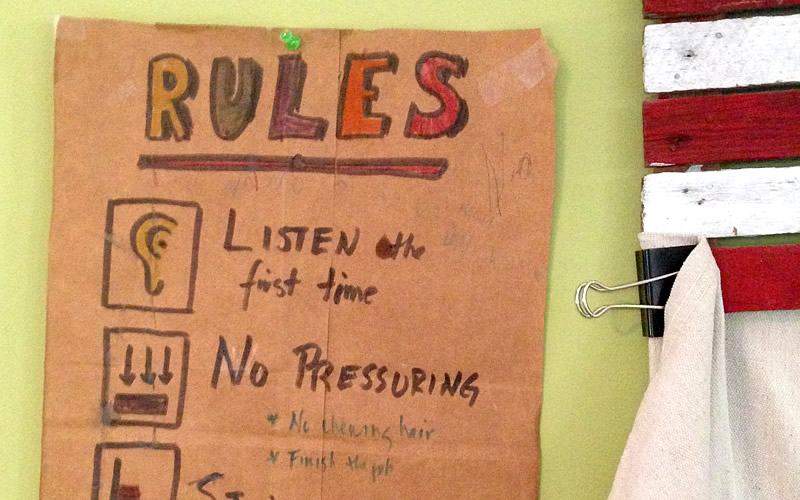
By Andy Brack, editor and publisher | We’re surrounded by rules. They’re what make the world go round without everybody stepping all over everybody else.
Some rules are overt: Speed limits, no murdering others, pay taxes, don’t hit your little sister. Some of them are more covert: You don’t tell the lady next to you at church that her dress or hairstyle is horrible. You don’t laugh out loud when some guy says something monumentally stupid.
![]() At different points of your life, you have different rules. Most of them boil down to this: Use common sense which, these days, seems to be uncommon. Hence, the need for the rules.
At different points of your life, you have different rules. Most of them boil down to this: Use common sense which, these days, seems to be uncommon. Hence, the need for the rules.
When one daughter was young and having challenges in a few areas, I wrote four rules on a brown paper bag and illustrated each with an icon. These rules were posted in a public place in the house so she could read them and remember them. Some still apply:
- Listen the first time (so we don’t have to repeat everything over and over).
- No pressuring (to try to get what you want; you don’t have to ask for the same thing over and over).
- Sit in your place (because it’s not nice to keep getting up during meals).
- Don’t seek approval. (Instead, earn it.)
Soon it became clear that two more rules needed to be added:
- No chewing hair (because it’s nasty. This rule was learned pretty quickly.)
- Finish the job. (Don’t start playing with something or doing something and just stop without finishing or putting it away. This rule definitely still applies.)
Over time, at work and in day-to-day living, we learn life has all sorts of other rules, written and unwritten. They help us in countless ways to adjust, adapt and predict. (Read the directions. Don’t eat so much sugar. Put down the lid on the toilet.)
Some don’t make sense at the time. (“Why do I have to make my bed?” Or, “why do I have to eat my vegetables?”). But they help to bring order — and better health — over time.
Years ago, my father, newspaperman Elliott Brack, developed 15 rules for business that seem to apply in just about any circumstance Observing them generally saves time, money and lots of headaches. Think a little about these rules, dubbed the “EEB MAXIMS:”
I. Observe deadlines.
II. Trust your instincts.
III. Pay for quality.
IV. Treat salesmen and visitors well.
V. Be first in something.
VI. Get inside the building.
VII. Better hiring means less firing.
VIII. Solve problems at lowest possible level.
IX. Always return your telephone calls.
X. About them sentence fragments.
XI. He who prints, pays.
XII. Never handle a piece of paper twice.
XIII. If you can make enough calls, you can make enough sales.
XIV. Try to get along with all, but do what you gotta do.
XV. Observe deadlines.
Yes, the first and last rules are the same. But in business — and life — they make a difference and make things a lot easier to deal with.
- What rules do you have that make life easier to deal with? Send your thoughts to: editor@charlestoncurrents.com.
FRIDAY’S COMMENTARY in Statehouse Report focused on how the June primary elections for the General Assembly may represent a battle for the soul of the legislature, particularly in the state Senate. Some 170 seats are up for grabs. Seventeen of 46 senators are running unopposed, but many face primary challenges. In the House, don’t look for much change as 69 of 124 incumbents are unopposed. Read more here.



 We Can Do Better, South Carolina!
We Can Do Better, South Carolina!
























